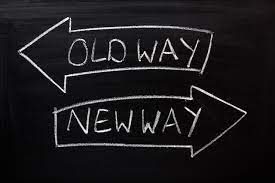We all say this, “Nothing happens until someone sells something.” I don’t know how many times I’ve used that expression. I was reminded of it reading an article the other day.
I started reflecting on this. It’s natural for we “sales” types to think about this. Our companies can’t build products, offer services, invoice, or get revenue until we sell something.
But on deeper reflection, it really is very self centered, and inaccurate.
Nothing happens until someone decides they need to make a change. This may be addressing a new opportunity, it could be solving a problem. There could be any reason that someone needs to make a change. It’s at that point that things change, so to speak.
The change process means is the start of everything for people who sell. It’s when they want to change, they may begin a buying process as part of the overall change they are making. Until a customer begins a change process, which includes a buying process, we have nothing to sell.
And that’s the mistake too many sales people make. We are “selling,” when the customer has no change process underway. If the customer is satisfied with what they are doing, if they see no reason to change, then however hard we sell, we are wasting both the customer and our time (and creating customer ill will.).
Stated differently, until the customer begins buying, we can’t begin selling! And the customer has no need to buy until they want to change.
But this presents an opportunity, and it has little to do with selling. Selling is about us. But change is all about th customer. And here’s where there’s a tremendous opportunity for those of us in sales.
How do we help the customer recognize the need to change? How do we help them recognize there is an opportunity to do something different? How do we help them recognize there is an opportunity do to something new, address an opportunity, solve a problem?
This is all about the customer.
Nothing happens until a customer decides to change!

Well stated…I always say there are 3 very important questions that need to be answered before a target can become a prospect: “Why change, Why now, and Why you!”
Do you have any good insights or frameworks for helping buyers recognize the need to change and challenge status quo?
Brian: Your questions are critical. I would add, “What are the consequences of not changing now?”
I think there are a number of standard frameworks that provide tools to help buyers recognize the need to change. Challenger is one. Having said that, I think deep understanding of the industry and deep understanding of the customer are starting points to having substantive conversations about how the customer might think differently. I think skills like curiosity, collaborative conversations, critical thinking, and problem solving are important to engaging the customer credibly.
There’s an interesting challenge for marketing people like you to think about. How do we engage customers in thinking about changing through their digital interactions? Would love your perspectives. Regards, Dave